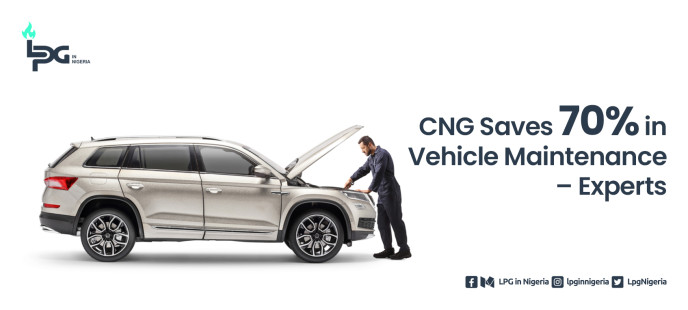- 3515
- 0
Sharing Ideas and Updates on LPG in Nigeria and related information to enable effective collaboration within the LPG Value Chain
CNG Saves 70% In Vehicle Maintenance – Experts

Automobile experts have revealed that using Compressed Natural Gas (CNG) in vehicles can reduce maintenance and running costs by 70% compared to cars powered by Premium Motor Spirit (PMS). In interviews with the News Agency of Nigeria (NAN), they highlighted CNG’s benefits, such as fuel efficiency, environmental friendliness, improved engine performance, and extended engine longevity.
Mr. Bayero Farah, Director-General of the Nigerian Institute of Transport Technology (NITT), emphasized that CNG-powered vehicles significantly cut down on running expenses and offer better engine performance while meeting international emission standards. Unlike petrol and diesel, which are subject to fluctuating prices and production challenges, CNG prices remain stable, offering an economical alternative for vehicle owners.
However, Mr. Farah pointed out that the initial cost of converting vehicles to run on CNG is quite high. He also mentioned challenges such as the availability of gas and the need for technical expertise for repairs and maintenance. Despite these hurdles, the government, alongside the NITT, is actively working to establish conversion facilities across the country as part of the Presidential CNG Initiative (PCNGI). This initiative aims to build conversion, repair, and maintenance services and raise awareness about the benefits of using CNG.
Mr. Oseni Suleiman, National President of the Amalgamated Union of Motor Mechanics and Technicians (AUOMMATON), echoed these sentiments, emphasizing that CNG cars are cheaper to maintain than petrol-powered ones. CNG burns cleaner, reducing wear and tear on engines and producing fewer emissions. Despite the advantages, Suleiman pointed out that CNG refill stations are still limited in Nigeria, making it less accessible for many drivers.
CNG is also considered safer in the event of a spill, as its gaseous nature disperses quickly, minimizing the risk of fire or explosion. Suleiman called for more training programs for Nigerian artisans to support the growing demand for CNG conversions.
Car dealer Mr. Julius David, CEO of Prince Autos in Abuja, noted that more customers are requesting CNG vehicles, recognizing the benefits, especially during periods of petrol scarcity when fuel prices skyrocket. With CNG being cheaper and more environmentally friendly, it has become an attractive alternative for many Nigerians.
CNG vehicle owners also shared their experiences with NAN, affirming the cost-effectiveness and ease of maintenance. Mr. Joseph Oluebube, a CNG car owner, mentioned that a full tank of CNG costing N4,000 lasts over a week, despite his daily commute between Kubwa and Garki in Abuja.
However, concerns remain about the high cost of converting petrol cars to CNG, which ranges from N700,000 to N1 million. Many users called on the government to increase the number of CNG conversion centers and filling stations to make the transition more accessible to Nigerians.
In my opinion, the shift towards Compressed Natural Gas (CNG) as a vehicle fuel in Nigeria is a smart move, offering substantial long-term benefits despite the initial cost of conversion. The 70% savings on maintenance and running expenses alone make it an attractive alternative to petrol. Also, CNG’s environmental advantages, such as lower emissions and cleaner engine performance, align with global goals for reducing pollution. However, the limited availability of CNG refill stations and the high conversion cost remain significant challenges. With stronger government support, increased infrastructure, and more widespread training for technicians, CNG could become a more accessible and sustainable energy solution for vehicle owners across Nigeria.
Visit our last blog post on how many Lagosians are currently embracing CNG conversion.
Source: The Punch News.
















0 Comment.